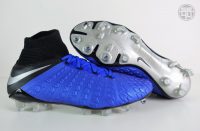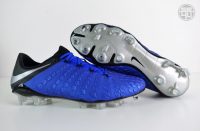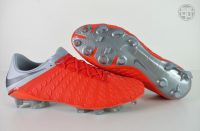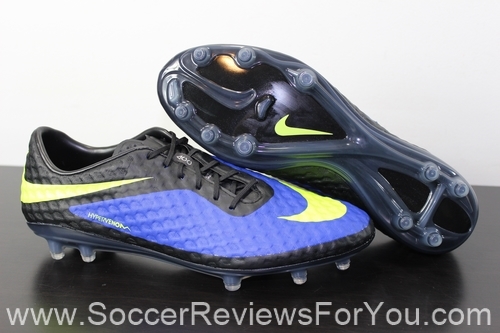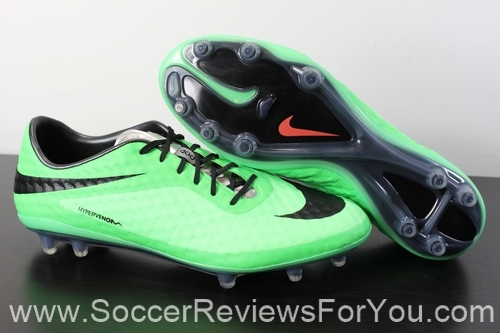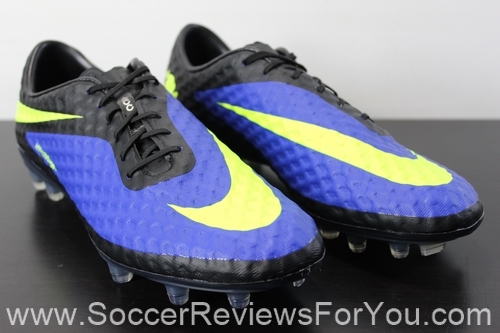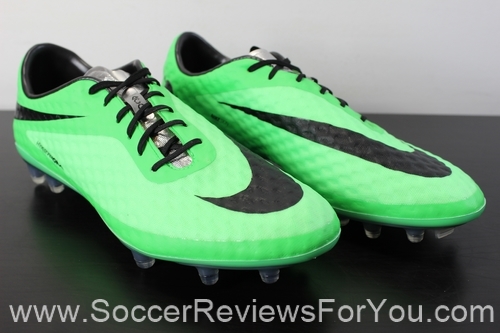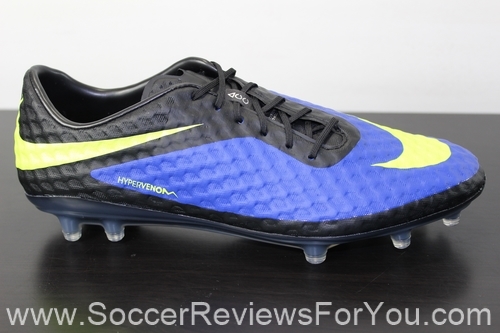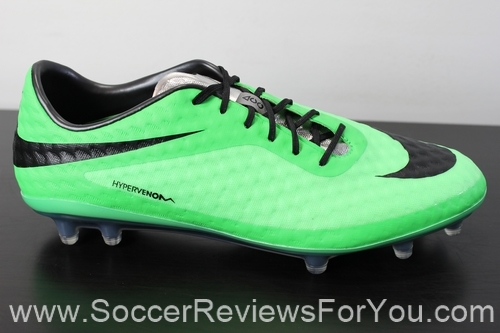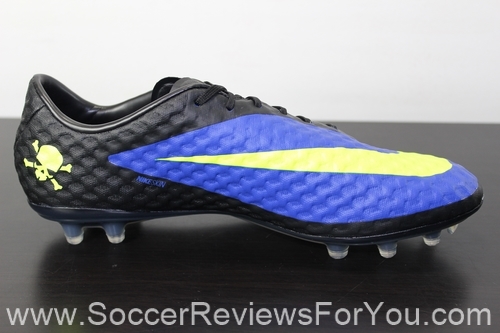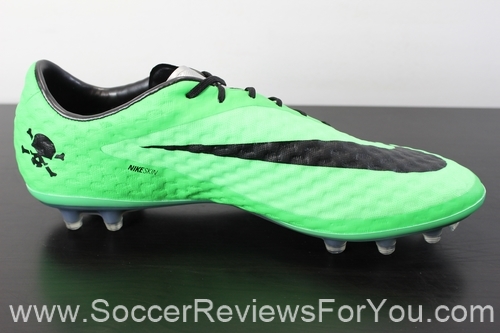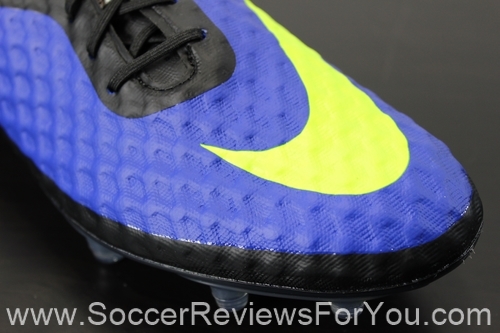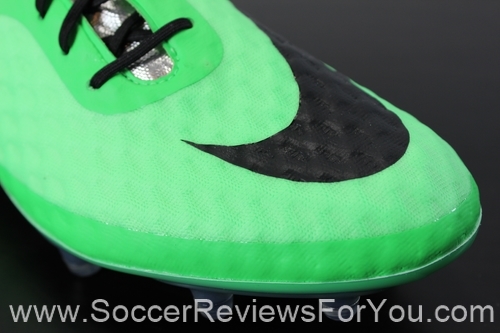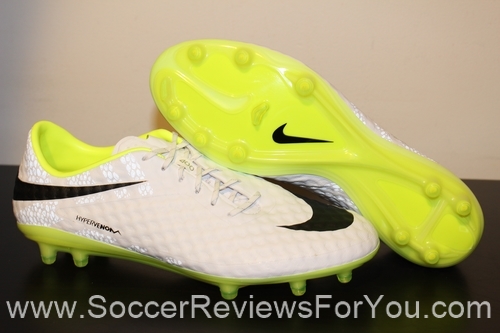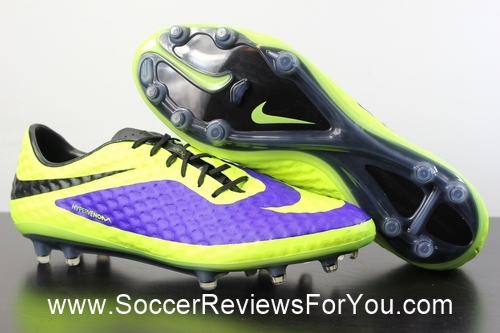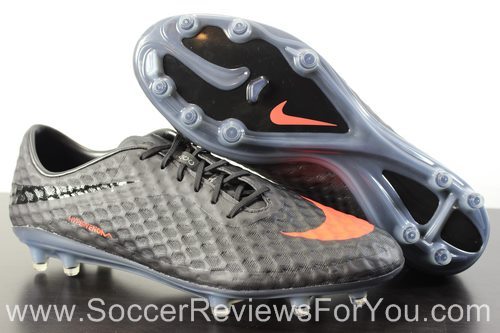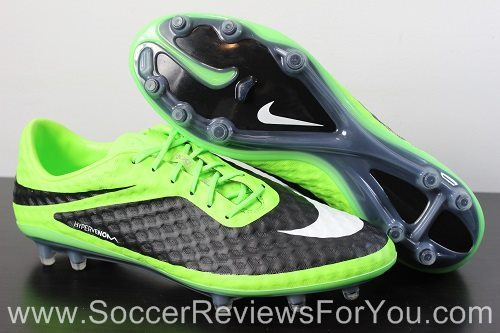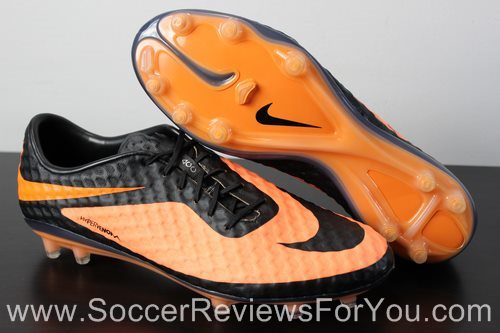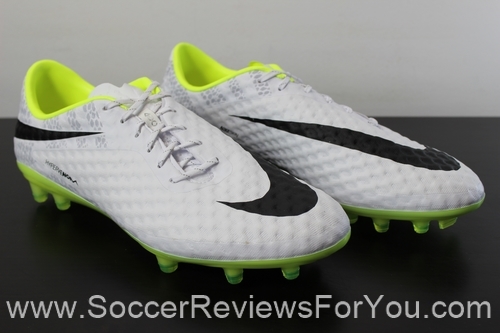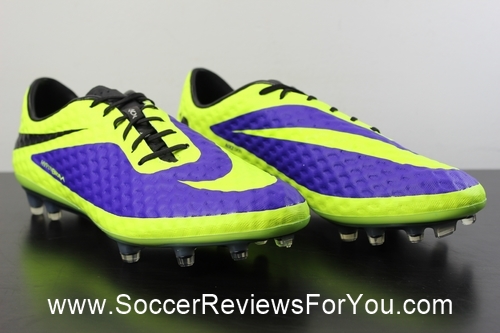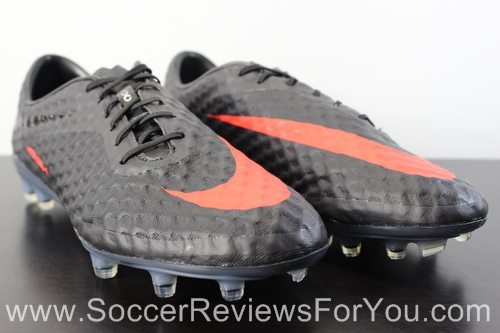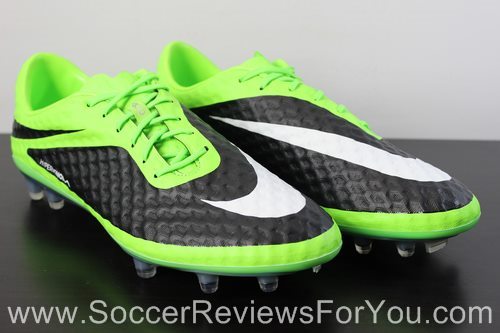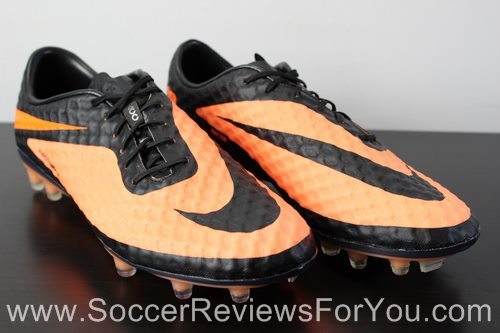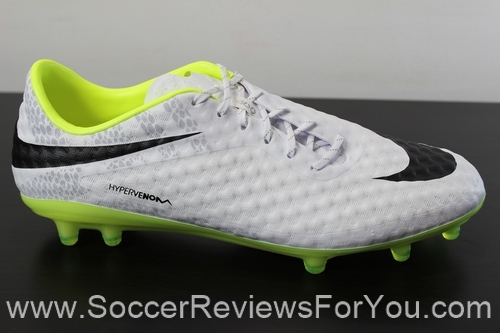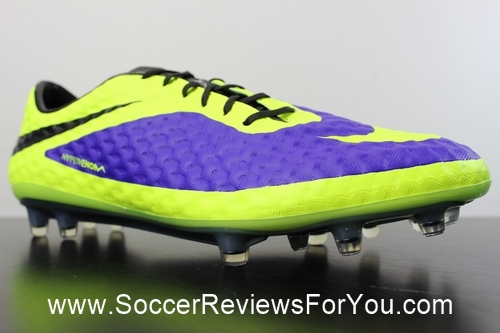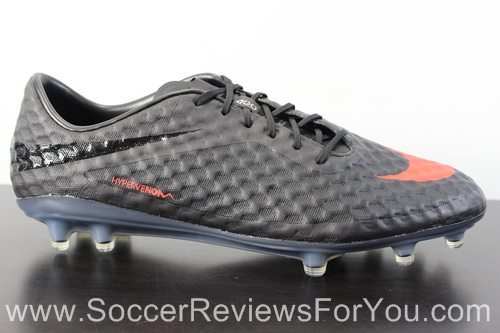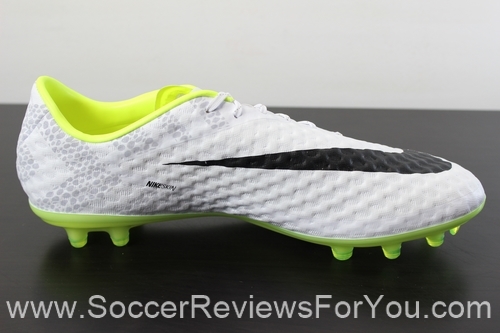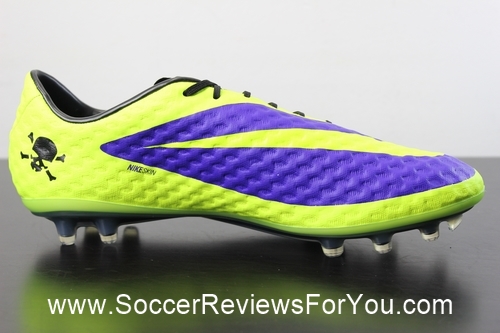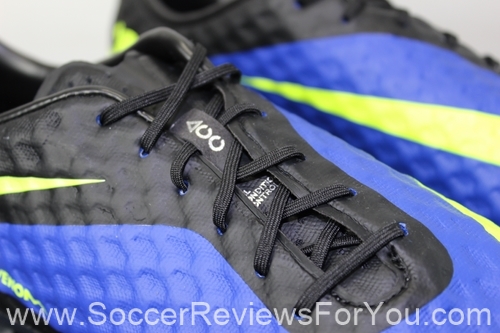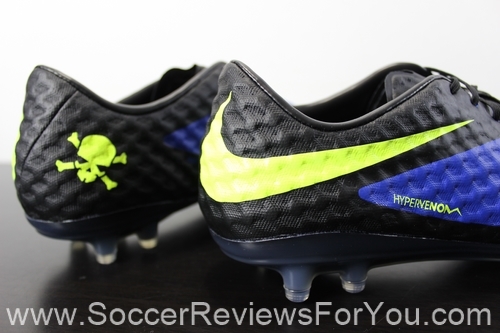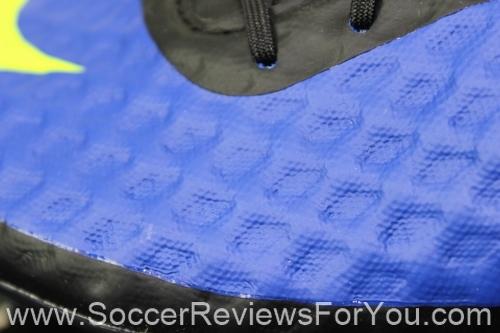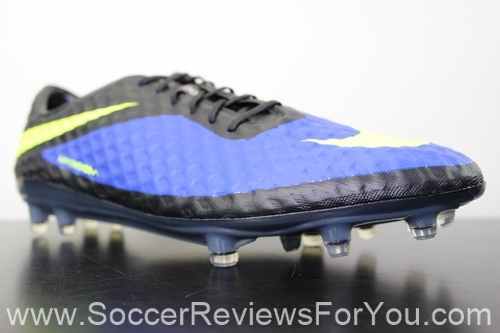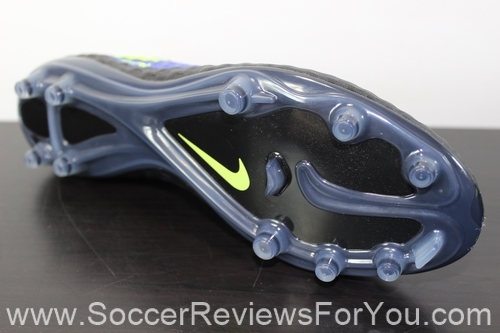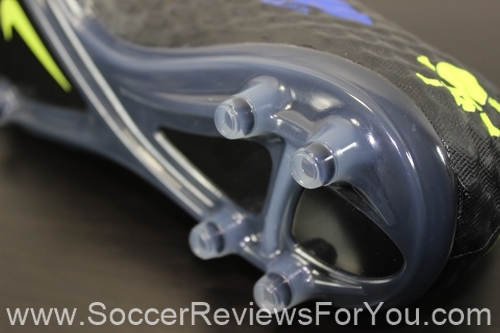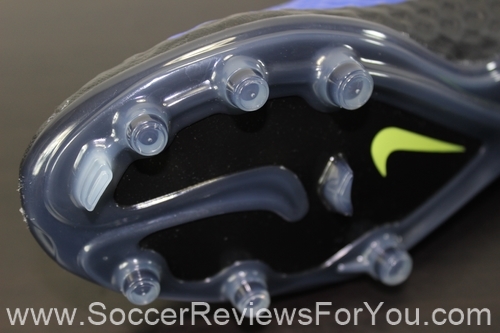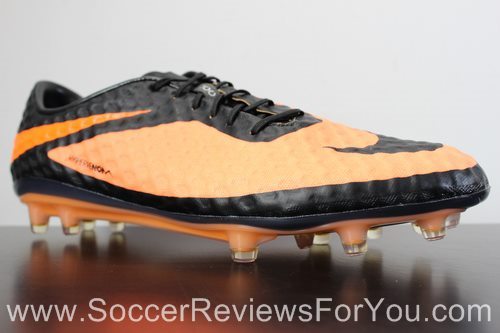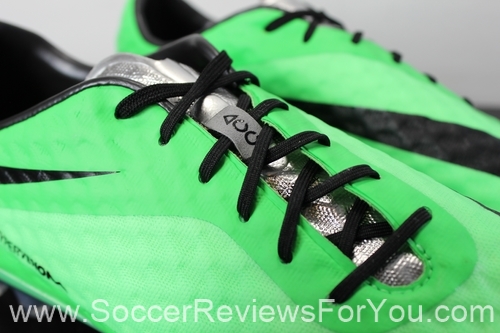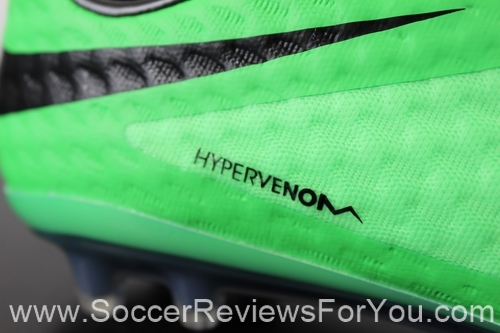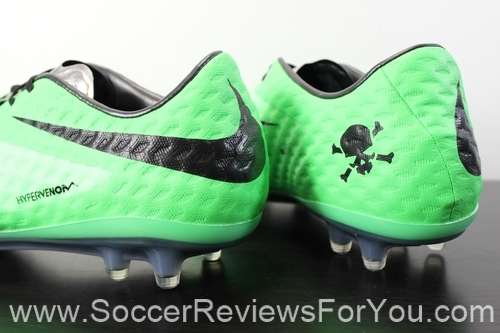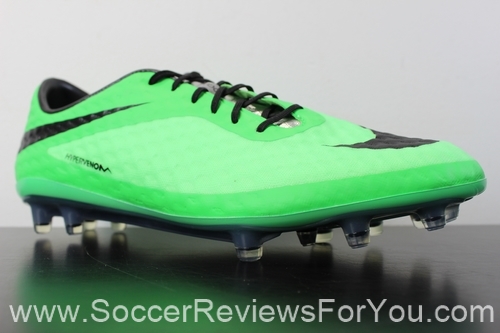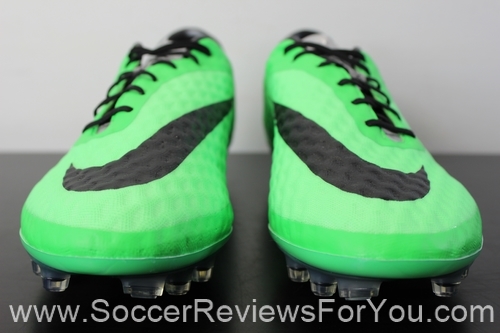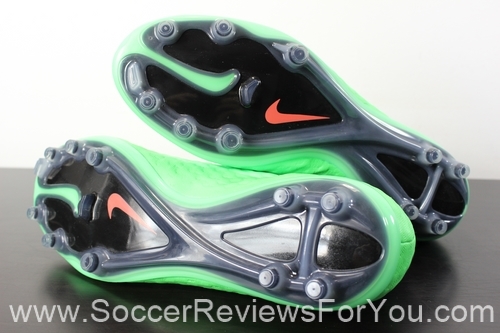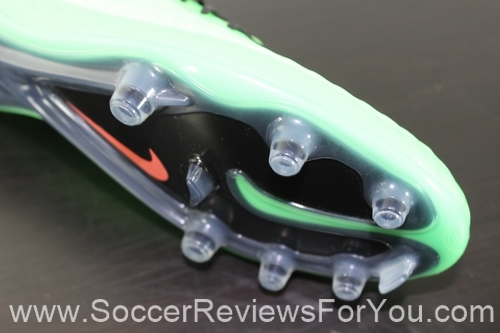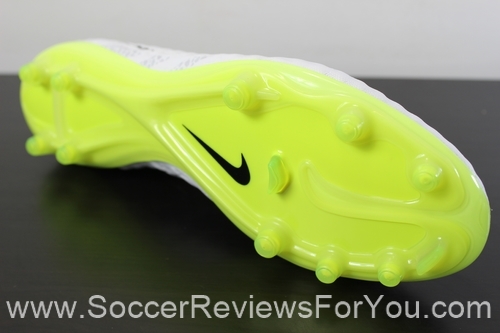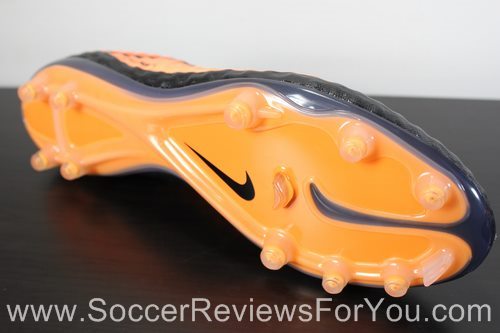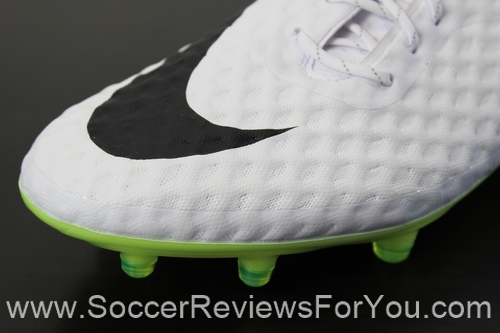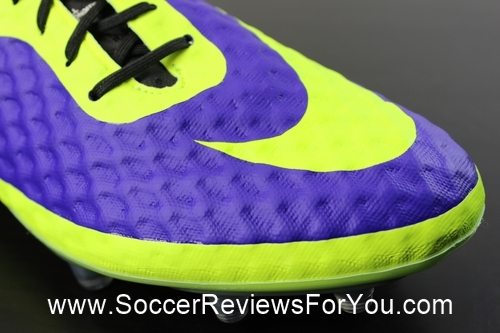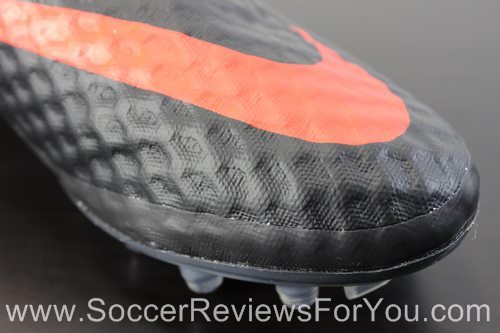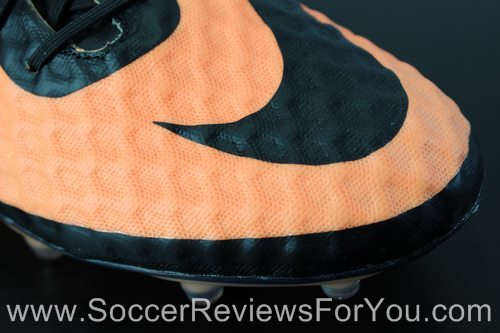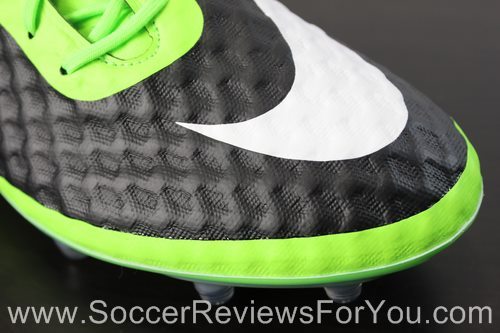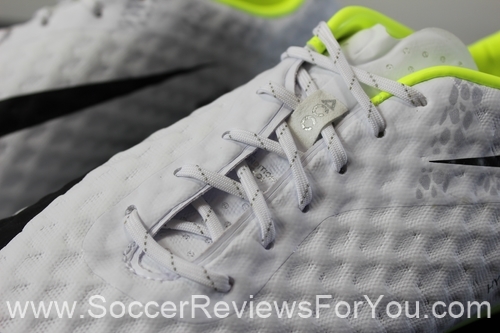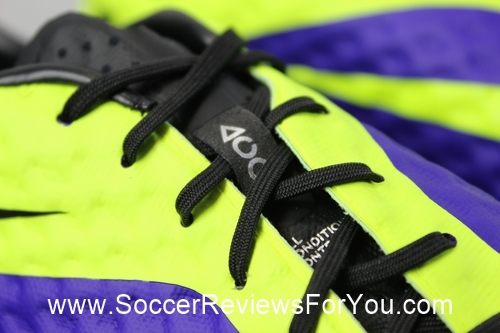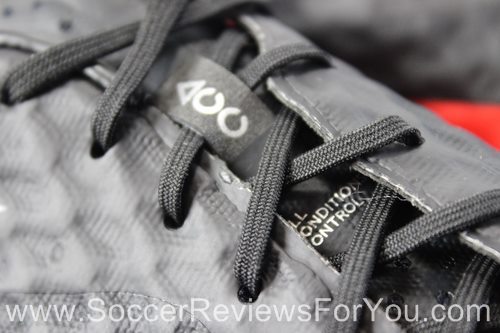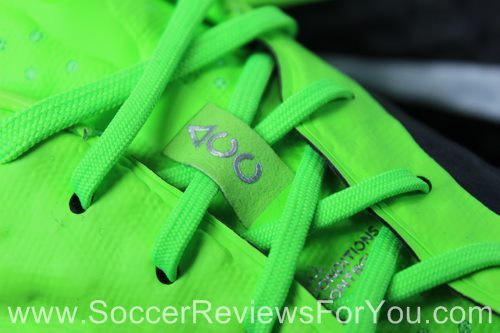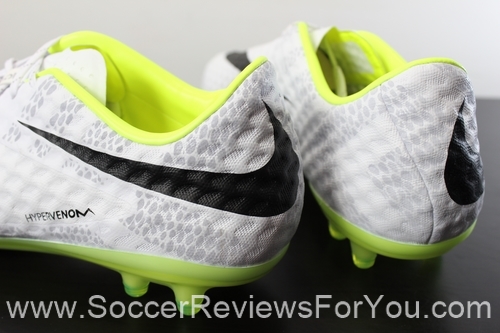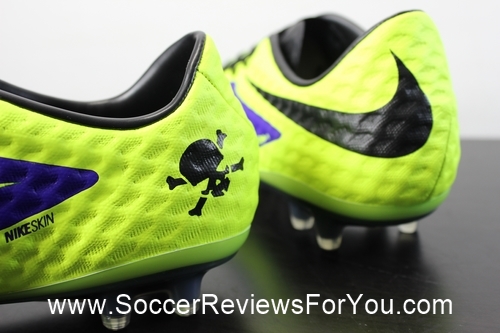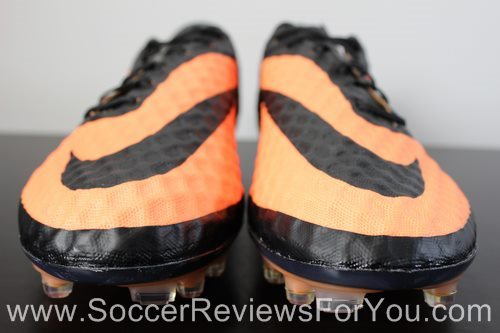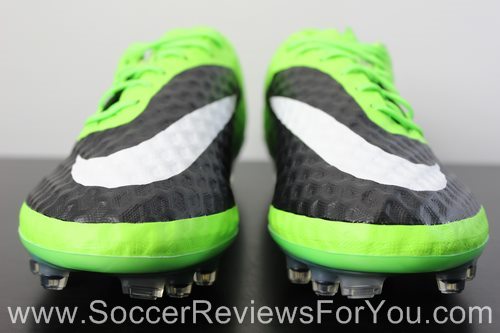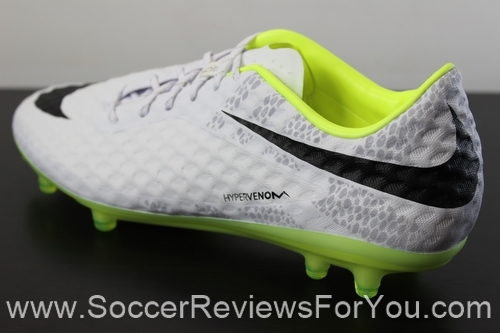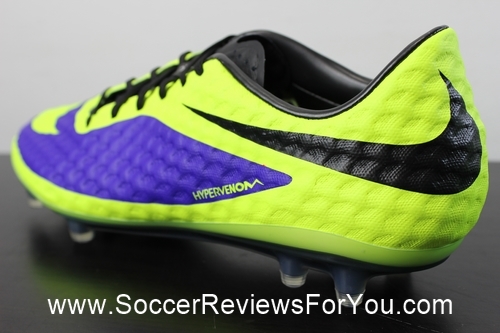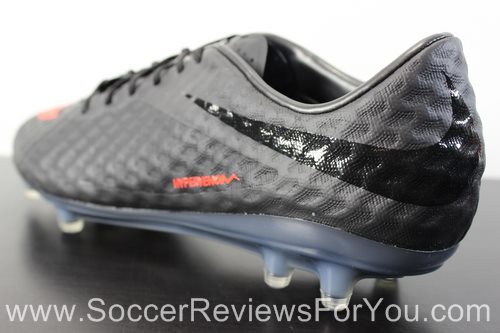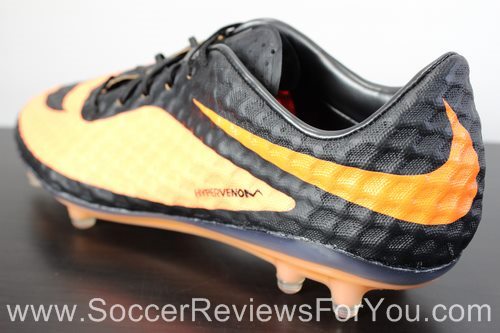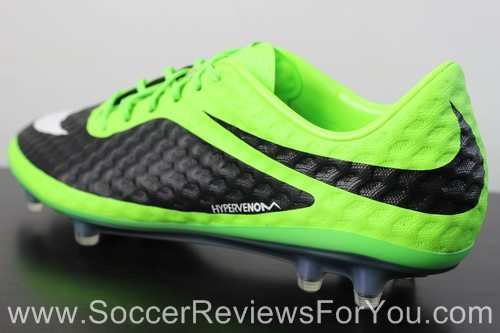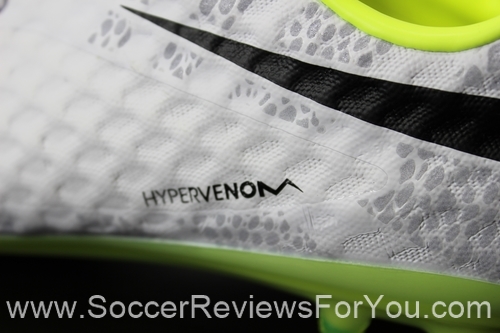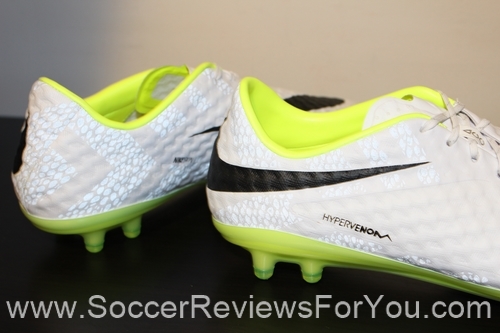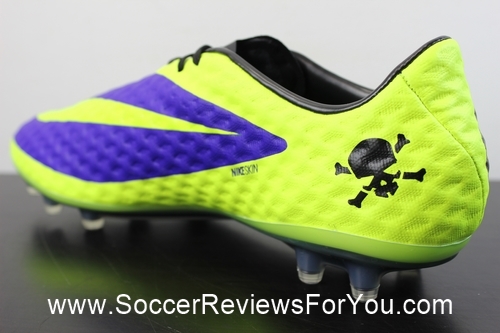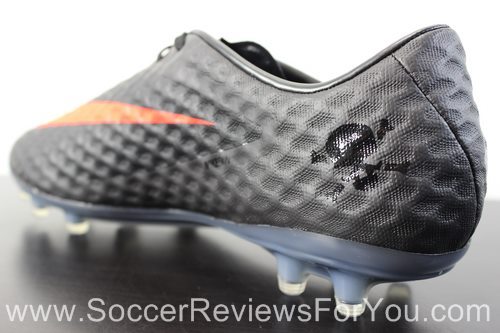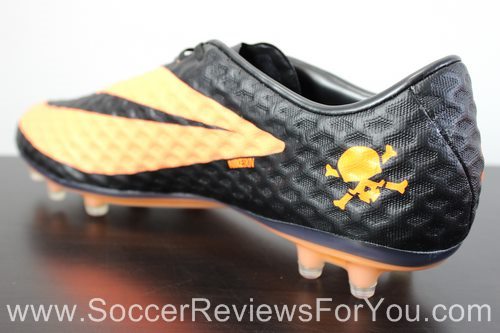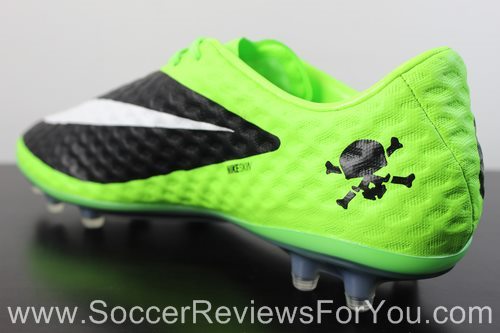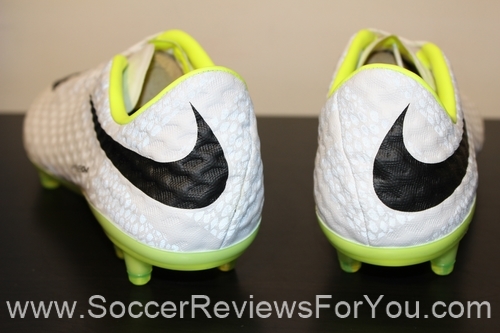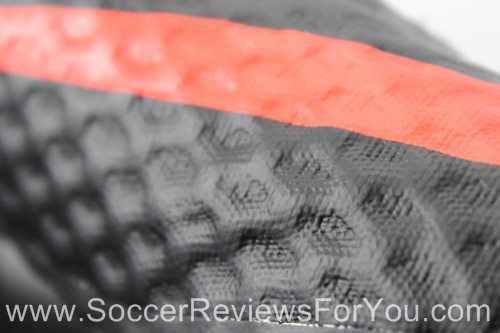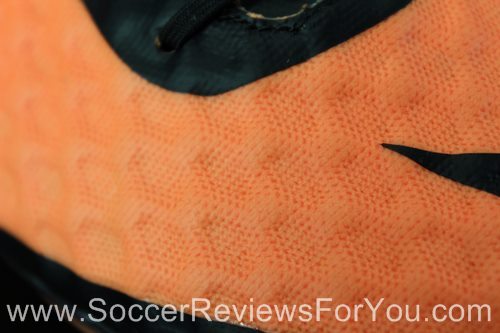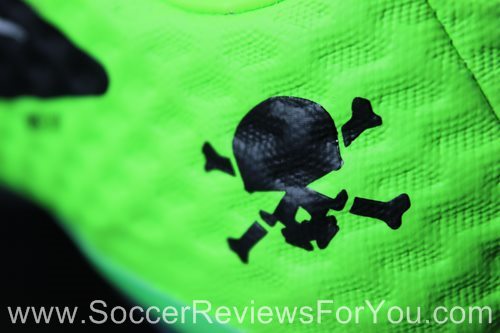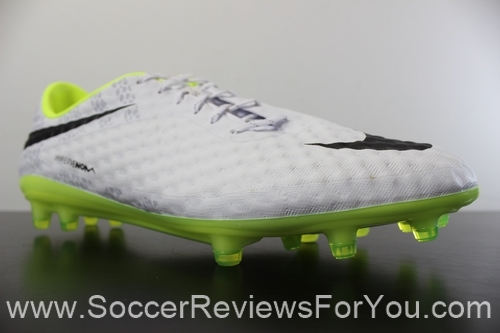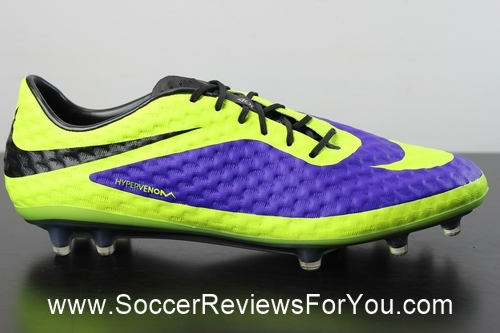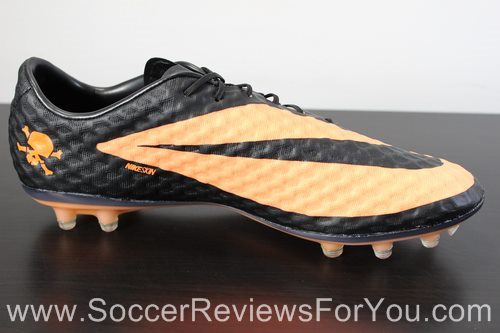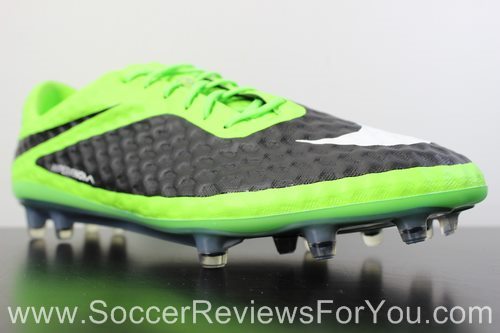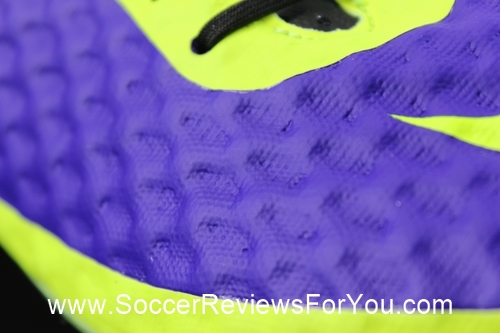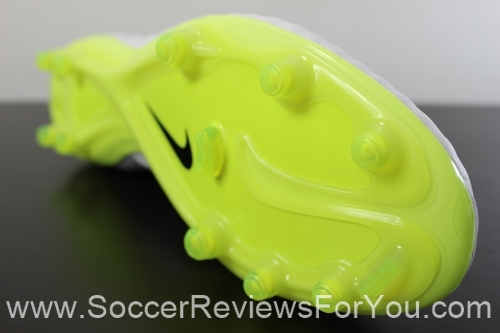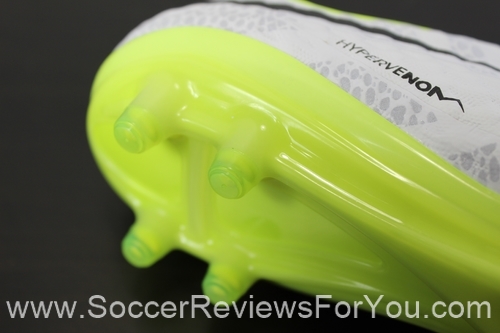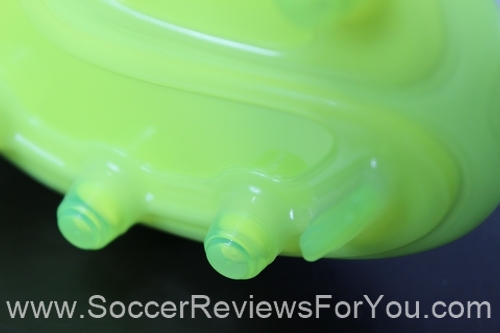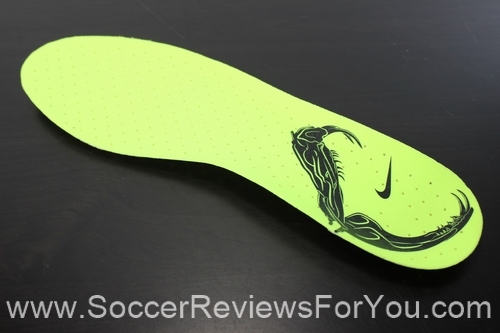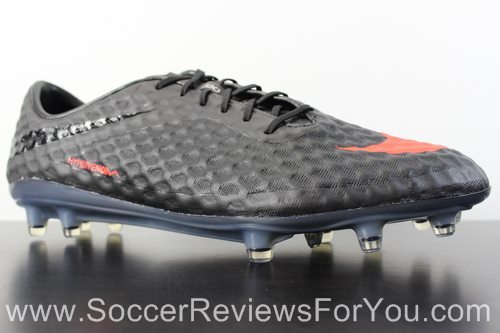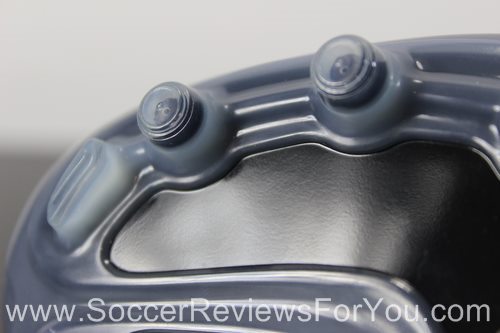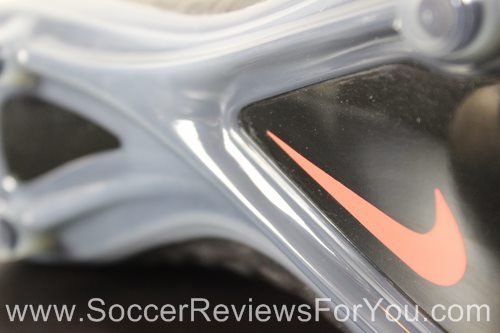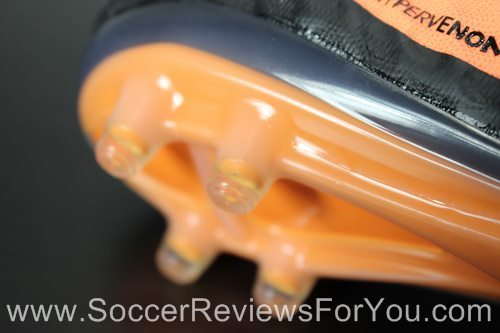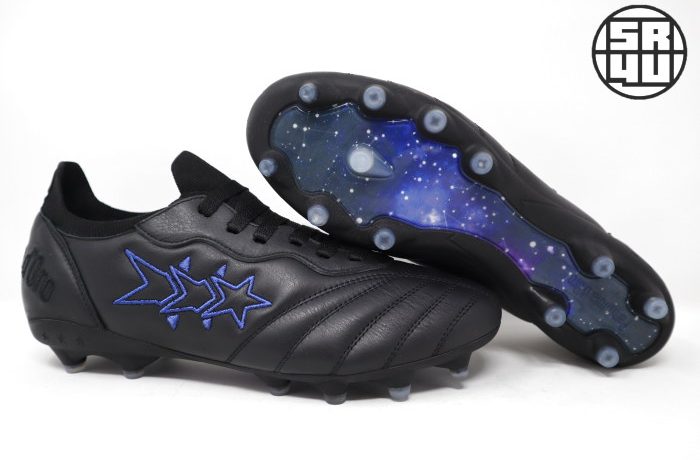Nike Hypervenom Phantom Review
The main attraction of the Nike Hypervenom Phantom is the upper, giving the boot a true “second skin” feel. Upon holding the shoe in your hands for the first time, you’ll notice the strange texturing, softness and flexibility of the upper. This unique material is called “NikeSkin” and it is constructed from two main elements that are fused together. The first element of NikeSkin is made up of a thin, micro-mesh webbing, stitched in a honeycomb-like pattern, while the second element is made up from several thin, membrane-like layers of polyurethane. This material not only gives the boot a unique look, but also an incredible feel. When it comes to comfort, the NikeSkin upper offers fantastic flexibility and softness, giving the boot a sock-like feel. Since the upper is so thin, it moves very naturally with the bend of your foot, with very minimal creasing. Most thin synthetic boots, like Nike’s own Mercurial Vapor 9, tend to have a very tight, almost restrictive feel, but the Phantom is different in that it has that tight fit, with a more natural feel, similar to what you might find from a leather boot.
The entire upper, including the tongue, is crafted from NikeSkin synthetic, giving the boot a very uniform feel across the entire foot. The lacing system is perhaps the closest comparative feature that has made its way onto the Hypervenom line coming from the previous T90 model, with the laces being pushed to the lateral side of the boot. The lacing system itself is relatively shallow, not allowing you to tighten most of the forefoot area of the boot. Normally this would be an issue, but this particular lacing setup is designed to work in junction with the new X1.1 last, as well as the shape of the upper. When you pull the laces tight, you’ll find that the mid-foot area of the boot hugs both the lateral and medial sides of your foot quite snugly, while the slightly narrow cut of the toe box area helps to secure the front of the foot.
Other comfort elements of the boot include a low-cut heel, lined in synthetic leather, similar to what you’ll find on the Mercurial Vapor 9. The removable insole is relatively low profile, with a mesh top-liner and perforations throughout, providing some decent step-in comfort. The glass nylon soleplate provides plenty of rigidity, eliminating any kind of possible stud pressure. I did find the soleplate to be a little stiff from right out of the box, but after an hour or so of wear-time, it will feel a lot more flexible, while still maintaining a nice responsive feel.
The X1.1 last is supposedly designed to “enhance” agility by mirroring the natural curves of the foot. The shape is actually very similar to the Mercurial series, which is not a bad thing, but with a little more width through the mid-foot and forefoot areas of the boot. From right out of the box, you’ll notice that the boot has a very tight fit, but give it an hour or two of break-in time, and the NikeSkin upper will stretch and form to your feet really nicely. I wasn’t expecting the upper to stretch as much as did, especially considering that it is a synthetic, but the thin NikeSkin upper has the amazing ability to form to your feet to create that second skin feel. After some break-in time, the Hypervenom Phantom will suit most foot types, given that you don’t have excessively wide feet. The shape of the boot in combination with the NikeSkin synthetic upper makes for what is, in my opinion, the most comfortable thin synthetic boots currently on the market.
Sizing is pretty straight forward with the Hypervenom Phantom, as it is with most Nike models. I wore my usual size 9US for review, and the fit in the length was absolutely perfect. So, if you’re looking to order a pair for yourself, I would strongly recommend going true to size for the best possible fit.
Weight
The Hypervenom Phantom weighs in at an impressive 7.2oz, which shouldn’t be much of surprise considering the low-profile design of the boot. The tight fitting nature of the boot in combination with how comfortable it feels, makes for an experience where you might even forget that you’re wearing anything on your feet at all. If you’re looking for that lightweight feel, than the Phantoms will provide that for you.
Traction
The stud pattern featured on the Hypervenom is geared towards agility, and I can confirm that it really does perform well. Upon comparing the stud pattern to other Nike models, you’ll notice some similarities on the Hypervenom stud pattern to that of the Mercurial Vapor 9. The five main studs featured on the FG stud pattern on the Vapor 9, can also be found in the same spots on the Hypervenom, but in the form of conical studs as opposed to the blades. The layout features three conical studs on both the lateral and medial sides of the forefoot, with one bladed stud at the tip of the toe and one support stud in the middle, while the heel features four conical studs, two on each side.
The thin profile of the conical studs, allows for plenty of ground penetration with every cut, while the conical shape makes for plenty of freedom to twist and pivot when planted. The studs are positioned in all of the main push-off points at the base of the forefoot and toe area, providing optimal traction no matter which direction that you cut. On firm, natural grass playing surfaces, I had no issues at all with slippage. One of my personal favorite elements of the stud pattern is the single bladed stud positioned on an angle at the tip of the toe. It gives you that little bit of extra grip when pushing off, which makes all the difference when making that first step.
The split toe design of the soleplate is one of the new technologies brought forward by the Hypervenom Phantom. The split design is supposed to allow for more articulated flexibility on the forefoot area of the boot, in order to make for a more natural feel, but in all honesty, I didn’t really notice any difference in feel at all. The split is not as dramatic as you might expect, as I couldn’t feel any extra flexibility in the soleplate either in-hand or on feet. With that being said, it doesn’t hurt the feel of the boot, it’s just a feature that doesn’t make as big of an impact as you might expect.
The Hypervenom stud pattern is definitely a winner. The layout is great, and I personally love the feel of the conical studs. It offers the best of both worlds when it comes to conical and bladed stud patterns, and is one of my new personal favorites when it comes to traction and responsiveness.
Touch
The Phantom provides a very unique feel for the ball. It has the qualities of a thin synthetic as well as some of the natural padding that you might get from leather. With that being said, NikeSkin by no means feels like leather. The PU membrane itself is extremely thin, but due to the bulk of the micro-mesh webbing, you not only get a textured finish, but also a slightly cushioned feel. It’s difficult to compare the feel to other boots, mainly because there really isn’t anything like it. The tight fit and flexibility of the upper gives the boot a very natural feel, almost as if the upper is an extension of your foot. The key take away is that NikeSkin is very thin, but still feels very soft.
The upper also features a unique finish, which gives the boot a slightly grippy feel on the ball. This “X-Ray” texturing gives the upper a somewhat waxy feel to the touch. Unlike many grip elements, the X-Ray texturing doesn’t give the boot a sticky feel on the ball, but instead provides something more along the lines of what I would call a “soft touch” style of grip, if that makes sense. It will feel a little weird at first, but after 20 minutes or so, you’ll get used to it, and if you’re anything like me, come to love the feel.
Just like the other top-end models from Nike, the Hypervenom Phantom also includes ACC (All Conditions Control) technology. Think of it as a “wet weather” control element, allowing for the best possible touch on the ball in all types of playing conditions. Basically, it doesn’t allow water to sit on the outside layer of the upper, so you won’t have as slick of a touch on the ball when playing in the wet. ACC itself, is not actually a coating either, but is actually something that is permeated to the upper itself. The process by Nike is pretty secretive, but we do know that ACC is actually in the makeup of the Teijin Synthetic upper, rather than being a coating that could wear away.
So, does it work? The answer to that is not exactly straight forward, because it does what it is supposed to do, but at the end of the day, control is down to the player and not the shoe. When playing in wet weather, I noticed that the outside of the upper remains much less slick with ACC, in comparison to a non-ACC shoe. The ball doesn’t feel as slick against your foot when playing in wet weather, but again, the difference is not as significant as you might think. I would still argue that thin, synthetic boots are the most difficult to use when playing in the wet, as opposed to using a shoe with a more cushioned feel to the upper. With that being said, I would rather have ACC on my shoe than not have it. I like ACC for the simple fact that it has the ability to disappear when its not activated. Many has concerns about the NikeSkin synthetic not being water resistant, and after testing the boots out in wet playing conditions, I can tell you that the upper of the Phantom is just as water resistant as any other synthetic boot.
Shooting
Being that the Hypervenom line is replacing the T90 line, a style of shoe designed around providing the perfect strike on the ball, one would anticipate a pretty good shooting experience from the Phantom. I was a huge fan of the last T90, the Laser 4, and after wearing the Phantom, I’m happy to report that it doesn’t disappoint when it comes to striking the ball. The Phantom does not feature any fancy striking elements, but what you do get is a very clean striking area, with the laces being pushed to the lateral side of the upper. The tight fit in combination with the small amount of padding provided by the NikeSkin upper gives the boot a very responsive feel when taking a shot. You feel every bit of the ball, giving a great sense of control when picking the corners.
The X-Ray texturing also plays its part in providing a little bit of extra grip on the ball when curling a shot, which is something that I personally enjoyed about the shoe. The glass nylon soleplate provides plenty of rigidity through the mid-foot and forefoot, giving the boot a very solid feel when laying into the ball. It’s definitely not a T90, but striking the ball still feels really good.
Protection
If protection is something that is important to you, than I would probably stay away from the Hypervenom Phantom. The NikeSkin upper, while it provides a slightly cushioned touch on the ball, provides very little in the way of impact protection. The material is super soft and flexible, not to mention thin, so should you get stepped on, you’ll feel every bit of the blow. Like any thin synthetic boot, you give up protection for a certain feel, and the Phantom is no different. The only protective element featured on the boot is the Internal plastic heel counter, which should provide some decent protection should take a kick to the back of the heel. It’s all down to preference at the end of the day, and if protection isn’t your first priority, than you shouldn’t have any issues wearing the Phantom.
Durability
Durability is always a concern, especially when your talking about an all-new design, featuring an all-new synthetic, but I personally did not have any issues with the Hypervenom Phantom, and I have tested multiple pairs at this point. After some wear-time, you’ll notice that the upper does stretch, and the synthetic becomes very soft, but still feels solid. One thing that I know will worry some people is the bond between the soleplate and the upper, mainly because it appears to be very weak. The reason for this is due to the NikeSkin synthetic not being a flat surface, so the bond of the upper around the edges of the boot may show slightly larger gaps than you might be used to seeing. Don’t worry, the boot is not broken and nothing is coming apart. The upper is fully cemented to the soleplate all the way through, so even if you do see a little bit of a gap between the soleplate and upper, the structural integrity of the boot has not been compromised. This is a normal occurrence and nothing to worry about when it comes to the longevity of the boot.
For the most part, the Hypervenom Phantom is very well made, especially for being so lightweight. I see no reason at all why this boot shouldn’t get you through at least season’s worth of play.
Keep in mind that the firm ground version of the Hypervenom Phantom, or any FG soccer shoe for that matter, is for use on natural grass playing surfaces, and not artificial grass or turf. Using any FG soccer shoe on an artificial playing surface will have a major impact on the longevity of the boot. If you’re going to be playing regularly on artificial grass, the Hypervenom Phantom is also available with an AG soleplate and stud pattern.
The Verdict
I didn’t know what to expect from the new Hypervenom line. It brings forward new ideas, new technologies and new materials, all to create what is one of, if not the most unique boot currently on the market. The incredible fit in combination with the sock-like feel of the NikeSkin synthetic upper gives the shoe an incredibly natural feel, while the responsive glass nylon soleplate and stud pattern provides you with all of the performance elements that you could possibly want. Many compare the Hypervenom Phantom to the Mercurial series from Nike, and while there are similarities between the two designs, the final product is completely different when it comes to feel and performance. The Phantom has quickly become one of my personal favorites, and if you were at all thinking about giving these a try, than my best advice is to go for it.
| Comfort/Fit | 10 out of 10 |
| Weight | 9 out of 10 |
| Traction | 10 out of 10 |
| Touch | 10 out of 10 |
| Shooting | 10 out of 10 |
| Protection | 6 out of 10 |
| Durability | 8 out of 10 |
| FINAL SCORE | 63 out of 70 or 90% |


